吉林大学:《综合英语精读》课程电子教案(PPT课件,一)11 Grammar Pattern drills
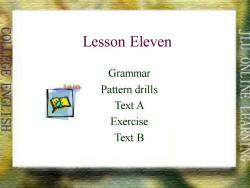
Lesson Eleven Grammar Pattern drills Text A Exercise Text B
Lesson Eleven Grammar Pattern drills Text A Exercise Text B
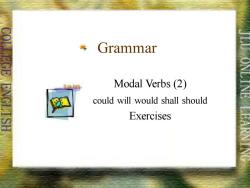
Grammar 迪地 Modal Verbs (2) could will would shall should Exercises
Grammar Modal Verbs (2) could will would shall should Exercises
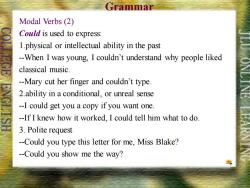
Grammar Modal Verbs(2) Could is used to express: 1.physical or intellectual ability in the past --When I was young,I couldn't understand why people liked classical music. --Mary cut her finger and couldn't type. 2.ability in a conditional,or unreal sense --I could get you a copy if you want one. --If I knew how it worked,I could tell him what to do. 3.Polite request --Could you type this letter for me,Miss Blake? --Could you show me the way?
Modal Verbs (2) Could is used to express: 1.physical or intellectual ability in the past --When I was young, I couldn’t understand why people liked classical music. --Mary cut her finger and couldn’t type. 2.ability in a conditional, or unreal sense --I could get you a copy if you want one. --If I knew how it worked, I could tell him what to do. 3. Polite request --Could you type this letter for me, Miss Blake? --Could you show me the way? Grammar
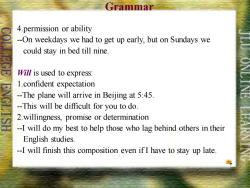
Grammar 4.permission or ability --On weekdays we had to get up early,but on Sundays we could stay in bed till nine. Will is used to express: 1.confident expectation --The plane will arrive in Beijing at 5:45. --This will be difficult for you to do. 2.willingness,promise or determination --I will do my best to help those who lag behind others in their English studies. -I will finish this composition even if I have to stay up late
4.permission or ability --On weekdays we had to get up early, but on Sundays we could stay in bed till nine. Will is used to express: 1.confident expectation --The plane will arrive in Beijing at 5:45. --This will be difficult for you to do. 2.willingness, promise or determination --I will do my best to help those who lag behind others in their English studies. --I will finish this composition even if I have to stay up late. Grammar

Grammar The interrogative of will in the meaning of willingness is often used to express requests;the negative indicates refusal. --Will you please fill in this form? --I have asked them not to make such a terrible noise,but they won't listen to me. 3.prediction --The game will be finished by now. --He'll talk for hours if you give him the chance. Would is used to express: 1.willingness or intention in the past --My friend said he would see me off at the railway station
The interrogative of will in the meaning of willingness is often used to express requests; the negative indicates refusal. --Will you please fill in this form? --I have asked them not to make such a terrible noise, but they won’t listen to me. 3.prediction --The game will be finished by now. --He’ll talk for hours if you give him the chance. Would is used to express: 1.willingness or intention in the past --My friend said he would see me off at the railway station. Grammar
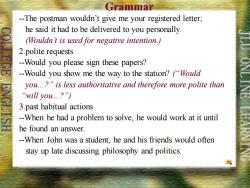
Grammar --The postman wouldn't give me your registered letter; he said it had to be delivered to you personally. Wouldn't is used for negative intention.) 2.polite requests --Would you please sign these papers? --Would you show me the way to the station?("Would you...?"is less authoritative and therefore more polite than “will y0u.?" 3.past habitual actions --When he had a problem to solve,he would work at it until he found an answer. --When John was a student,he and his friends would often stay up late discussing philosophy and politics
--The postman wouldn’t give me your registered letter; he said it had to be delivered to you personally. (Wouldn’t is used for negative intention.) 2.polite requests --Would you please sign these papers? --Would you show me the way to the station? (“Would you…?” is less authoritative and therefore more polite than “will you…?”) 3.past habitual actions --When he had a problem to solve, he would work at it until he found an answer. --When John was a student, he and his friends would often stay up late discussing philosophy and politics. Grammar
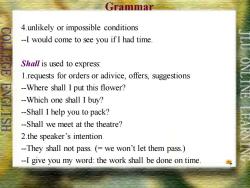
Grammar 4.unlikely or impossible conditions --I would come to see you if I had time. Shall is used to express: 1.requests for orders or adivice,offers,suggestions --Where shall I put this flower? --Which one shall I buy? --Shall I help you to pack? --Shall we meet at the theatre? 2.the speaker's intention --They shall not pass.(we won't let them pass.) --I give you my word:the work shall be done on time
4.unlikely or impossible conditions --I would come to see you if I had time. Shall is used to express: 1.requests for orders or adivice, offers, suggestions --Where shall I put this flower? --Which one shall I buy? --Shall I help you to pack? --Shall we meet at the theatre? 2.the speaker’s intention --They shall not pass. (= we won’t let them pass.) --I give you my word: the work shall be done on time. Grammar
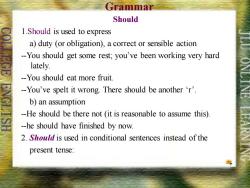
Grammar Should 1.Should is used to express a)duty (or obligation),a correct or sensible action --You should get some rest;you've been working very hard lately. --You should eat more fruit. --You've spelt it wrong.There should be another'r'. b)an assumption --He should be there not(it is reasonable to assume this). --he should have finished by now. 2.Should is used in conditional sentences instead of the present tense:
Should 1.Should is used to express a) duty (or obligation), a correct or sensible action --You should get some rest; you’ve been working very hard lately. --You should eat more fruit. --You’ve spelt it wrong. There should be another ‘r’. b) an assumption --He should be there not (it is reasonable to assume this). --he should have finished by now. 2. Should is used in conditional sentences instead of the present tense: Grammar
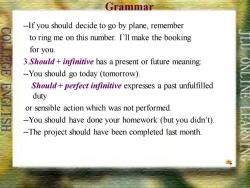
Grammar --If you should decide to go by plane,remember to ring me on this number.I'll make the booking for you. 3.Should+infinitive has a present or future meaning: --You should go today (tomorrow). Should+perfect infinitive expresses a past unfulfilled duty or sensible action which was not performed. --You should have done your homework (but you didn't) --The project should have been completed last month
--If you should decide to go by plane, remember to ring me on this number. I’ll make the booking for you. 3.Should + infinitive has a present or future meaning: --You should go today (tomorrow). Should + perfect infinitive expresses a past unfulfilled duty or sensible action which was not performed. --You should have done your homework (but you didn’t). --The project should have been completed last month. Grammar
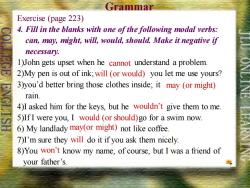
Grammar Exercise (page 223) 4.Fill in the blanks with one of the following modal verbs: can,may,might,will,would,should.Make it negative if necessary. 1)John gets upset when he cannot understand a problem 2)My pen is out of ink;will (or would)you let me use yours? 3)you'd better bring those clothes inside;it may (or might) rain. 4)I asked him for the keys,but he wouldn't give them to me. 5)If I were you,I would (or should)go for a swim now. 6)My landlady may(or might)not like coffee. 7)I'm sure they will do it if you ask them nicely. 8)You won't know my name,of course,but I was a friend of your father's
Exercise (page 223) 4. Fill in the blanks with one of the following modal verbs: can, may, might, will, would, should. Make it negative if necessary. 1)John gets upset when he understand a problem. 2)My pen is out of ink; you let me use yours? 3)you’d better bring those clothes inside; it rain. 4)I asked him for the keys, but he give them to me. 5)If I were you, I go for a swim now. 6) My landlady not like coffee. 7)I’m sure they do it if you ask them nicely. 8)You know my name, of course, but I was a friend of your father’s. cannot will (or would) may (or might) wouldn’t would (or should) may(or might) will won’t Grammar
按次数下载不扣除下载券;
注册用户24小时内重复下载只扣除一次;
顺序:VIP每日次数-->可用次数-->下载券;
- 吉林大学:《综合英语精读》课程电子教案(PPT课件,一)10 Grammar Pattern Drills.ppt
- 吉林大学:《综合英语精读》课程电子教案(PPT课件,一)09 Grammar Patten Drills.ppt
- 吉林大学:《综合英语精读》课程电子教案(PPT课件,一)08 Revision(I).ppt
- 吉林大学:《综合英语精读》课程电子教案(PPT课件,一)07 Using the Sun’s Energy.ppt
- 吉林大学:《综合英语精读》课程电子教案(PPT课件,一)06 Cambridge - the University Town.ppt
- 吉林大学:《综合英语精读》课程电子教案(PPT课件,一)04 Grammar Pattern Drill.ppt
- 吉林大学:《综合英语精读》课程电子教案(PPT课件,一)02(主讲教师:张莘梅).ppt
- 吉林大学:《英语听说》课程电子教案(PPT课件)unit17 At the Hotel 2.ppt
- 吉林大学:《英语听说》课程电子教案(PPT课件)unit21 Special English 2.ppt
- 吉林大学:《英语听说》课程电子教案(PPT课件)unit16 At the Hotel 1.ppt
- 吉林大学:《英语听说》课程电子教案(PPT课件)unit1-unit11(主讲人:董育英、寇晓虹).ppt
- 吉林大学:《英语听说》课程电子教案(PPT课件)unit23 Special English.ppt
- 吉林大学:《英语听说》课程电子教案(PPT课件)unit22 Special English.ppt
- 吉林大学:《英语听说》课程电子教案(PPT课件)unit20 Special English 1.ppt
- 吉林大学:《英语听说》课程电子教案(PPT课件)unit18-19 UNIVERSITY LIFE.ppt
- 吉林大学:《英语听说》课程电子教案(PPT课件)unit15 Service and economy.ppt
- 吉林大学:《英语听说》课程电子教案(PPT课件)unit14 Transportation.ppt
- 吉林大学:《英语听说》课程电子教案(PPT课件)unit13 family.ppt
- 吉林大学:《英语听说》课程电子教案(PPT课件)unit12 communuication..ppt
- 《大学英语语法》课程电子教案(PPT课件)09 替代(substitution)、省略(Ellipsis)、It- 句型(“It” patterns)、直接引语和间接引语(Direct and Indirect Speech).ppt
- 吉林大学:《综合英语精读》课程电子教案(PPT课件,一)12 Grammar Pattern Drills.ppt
- 吉林大学:《综合英语精读》课程电子教案(PPT课件,一)13.ppt
- 吉林大学:《综合英语精读》课程PPT教学课件(二)lesson 05 Beauty is Truth.ppt
- 吉林大学:《综合英语精读》课程PPT教学课件(二)lesson 06 Button, Button.ppt
- 吉林大学:《综合英语精读》课程PPT教学课件(二)lesson 07 Twelve Angry Men(Part One)By Reginald Rose.ppt
- 吉林大学:《综合英语精读》课程PPT教学课件(二)lesson 08 Twelve Angry Men(Part Two)By Reginald Rose.ppt
- 吉林大学:《综合英语精读》课程PPT教学课件(二)lesson 01 Christmas Day in the Morning.ppt
- 吉林大学:《综合英语精读》课程PPT教学课件(二)lesson 02 The Nightingale and the Rose.ppt
- 吉林大学:《综合英语精读》课程PPT教学课件(二)lesson 03 Clearing in the sky.ppt
- 吉林大学:《综合英语精读》课程PPT教学课件(二)lesson 04 Darken your Graying hair, and Hide your Fright.ppt
- 吉林大学:《综合英语精读》课程PPT教学课件(二)lesson 09 Pompeii.ppt
- 吉林大学:《综合英语精读》课程PPT教学课件(二)lesson 10 The Man in Asbestos(负责人:张而立).ppt
- 吉林大学:《综合英语精读》课程PPT教学课件(二)lesson 11 Diogenes and Alexander(主讲人:郑世华).ppt
- 吉林大学:《综合英语精读》课程PPT教学课件(二)lesson 12 Farewell, My Unlovely.ppt
- 吉林大学:《综合英语精读》课程PPT教学课件(三)lesson 13 Mr. Imagination.ppt
- 吉林大学:《综合英语精读》课程PPT教学课件(三)lesson 14 The Odour of Cheese.ppt
- 吉林大学:《综合英语精读》课程PPT教学课件(三)lesson 15 A Horseman in the Sky.ppt
- 吉林大学:《综合英语精读》课程PPT教学课件(三)lesson 16 The Oyster and the Pearl.ppt
- 吉林大学:《综合英语精读》课程PPT教学课件(三)lesson 17 Multinational Corporations.ppt
- 吉林大学:《综合英语精读》课程PPT教学课件(四)Book 4 lesson 1 The Pleasure of learning.ppt
